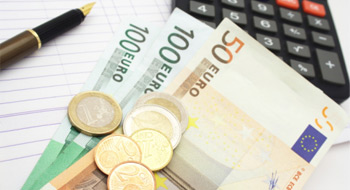

The European Central Bank on Thursday launched its most aggressive effort to date to revive the region’s ailing economy—announcing an 19-month program to buy 1.1 trillion euros in government and private bonds starting in March.
The size of the program exceeded investors’ expectations, and the value of the euro immediately fell on anticipation that the new money the ECB will pump out will drive down the currency’s value. A lower-valued euro would make European exports more affordable overseas and could lift inflation above dangerously low levels.
Fears have spread that the eurozone could face a period of chronic falling prices, or deflation, that can paralyze an economy. Earlier, the ECB kept its main interest rate unchanged at a record low 0.05%.
ECB President Mario Draghi and the ECB governing council made a key concession to critics of massive government bond purchases: They said the risk of any losses would stay with national central banks for 80% of the bonds bought. German officials had complained that bond purchases have the potential to spread losses from defaulting countries to taxpayers elsewhere.
The ECB acted after months of excessively low inflation in the eurozone that has discouraged borrowing and spending and kept the economy at risk of recession. The fate of the eurozone is vital for the global economy in part because Europe is a major trade partner for the United States, Britain, Eastern Europe, and Asia.
Read: Bank of Canada lowers rate to 0.75%
By pumping new money into the eurozone’s banking system, the ECB’s bond purchases should make loans cheaper and easier to get so companies can invest, expand and hire.
Still, the long-awaited program faces hurdles. Skeptics have suggested, for one thing, that the program will be too little, too late.
The ECB acted after the U.S. Federal Reserve completed three bond buying programs late last year. The Bank of England and the Bank of Japan have also done bond purchases.
Read: Expect more surprises from BoC
Draghi has faced opposition from two German members on the governing council. German Bundesbank head Jens Weidmann had argued that bond purchases could stick German taxpayers with losses in case of default. And he complained that the new stimulus would take pressure off governments such as those of France and Italy to impose reforms to cut regulation on hiring and firing and make their economies more business- and growth-friendly.
Draghi said it would be dangerous for euro countries to view the ECB’s bond-buying program as an a rationale to increase government spending. “That would undermine confidence,” he said.
But as the ECB has waited to unleash a government bond buying program, inflation has fallen farther behind the ECB’s goal of just under 2%, the level considered consistent with a healthy economy. When the official headline figure turned negative, analysts began saying ECB action was inevitable.
Economists note that government bond yields have already fallen substantially since the depths of the eurozone’s debt crisis in 2012. That means it will be hard to drive yields down much more.
Additionally, companies tend to get credit from banks, not the bond market, as they generally do in the United States. Banks will still get new money to lend when they sell their bonds to the ECB. But whether it reaches the economy depends on whether businesses see a reason to risk borrowing.
Read: A tactically cautious year ahead
Perhaps the biggest impact will be a lower exchange rate for the euro. That would make eurozone exports more competitive on price. And it would make imports more expensive, raising inflation.
The eurozone is still working off a crisis over too much government debt. Growth has been sluggish as governments in countries such as Italy, Spain, Greece, Portugal and Ireland, which have had to restrain spending and raise taxes to try to reduce debt. European leaders have warned that the eurozone must end its stagnation to win lasting public approval for the shared currency.
